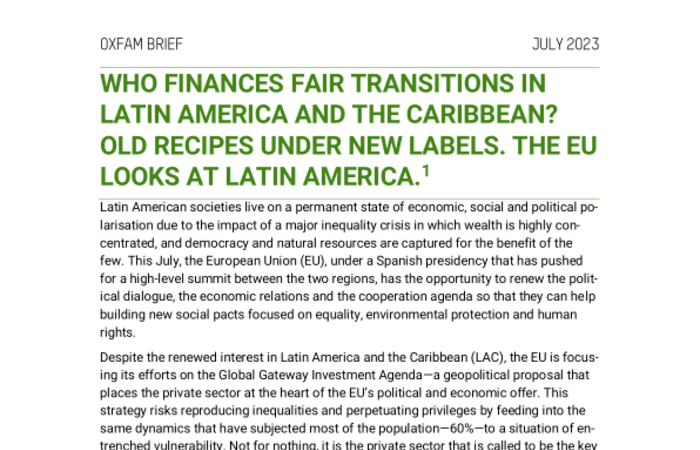Who Finances Fair Transitions in Latin America and the Caribbean?: Old recipes under new labels. The EU looks at Latin America – World

Latin American societies live on a permanent state of economic, social and political polarisation due to the impact of a major inequality crisis in which wealth is highly concentrated, and democracy and natural resources are captured for the benefit of the few. This July, the European Union (EU), under a Spanish presidency that has pushed for a high-level summit between the two regions, has the opportunity to renew the political dialogue, the economic relations and the cooperation agenda so that they can help building new social pacts focused on equality, environmental protection and human rights.
Despite the renewed interest in Latin America and the Caribbean (LAC), the EU is focusing its efforts on the Global Gateway Investment Agenda—a geopolitical proposal that places the private sector at the heart of the EU’s political and economic offer. This strategy risks reproducing inequalities and perpetuating privileges by feeding into the same dynamics that have subjected most of the population—60%—to a situation of entrenched vulnerability. Not for nothing, it is the private sector that is called to be the key actor in implementing the European cooperation agenda with LAC.
In a region where more than 380 million people live in a situation of vulnerability—almost 85 million in extreme poverty— and 91 billionaires concentrate a wealth of almost $400 billion, it is perplexing that the fight against inequality is not the central theme of the EU’s policy proposal for its “renewed relationship” with LAC.
Furthermore, we know that extreme inequality is linked to democratic disaffection. We know that most citizens feel that the region is governed by powerful groups. We also know that the more inequality and more influence the rich have, the more people distrust democracy.4 And we know that with each crisis, the ones who have the most are the ones who earn the most.
If the EU wants to align its interests with those of the people in the region, it needs to redefine the centrality of the private investment logic and give prominence to specific support for public initiatives that clearly speak of the fight against inequality as a driver for development, respecting human rights as the basic principle of any investment. That means adding the social transition to the green and digital transitions.
If the Global Gateway really aims at leaving its mark on the future of bi-regional relations, it must redirect its objectives toward a search for investments that respond to social and development objectives, put local communities in the driving-seat, and limit the negative effects on populations and the environment. To this end, it is essential to guarantee a democratic space in the debates to define a shared horizon of transitions.






